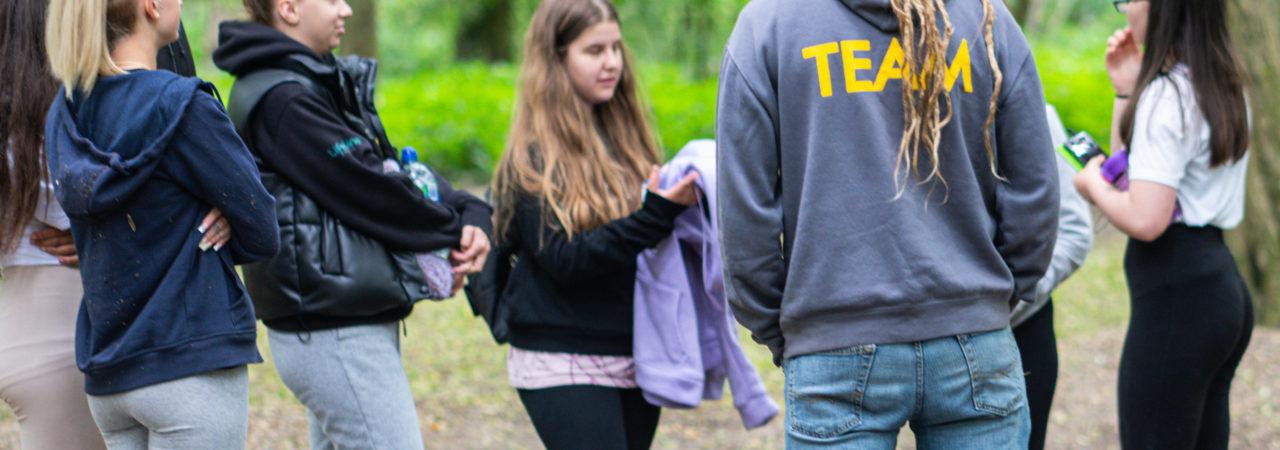A while ago, we shared some insights from the first year of SW!TCH Minds, our programme that works to improve the mental health of young people through mentoring and positive activities. Our work, of course, continues, and we hope to present a full look at the successes of the second year of the programme soon–but, in the meantime, we wanted to share a few of the inspiring stories we’ve been hearing from young people currently taking part in SW!TCH Minds.
Lee
Lee, one of the young people we work with, was taking part in a three-day residential in 2021. During one of the activities, our Lead Youth Development Worker Alex noticed that Lee wasn’t taking part with the others. Alex approached Lee to encourage him to join in but found that Lee was particularly adamant in his refusal. Alex knew that Lee had been taking part in other activities until now, so he reached out to Lee and tried to start a conversation.
Learning that Lee was currently living with his mum and sister, Alex began to ask him about his dad. When he noticed that Lee began to tear up at the mention, he quickly took Lee away from the group—moving to a safe space where they could talk more openly, and Lee could release his emotions.
As the pair walked and talked together, Lee opened up and began to cry as he explained his situation to Alex—when his parents have an argument, his mum stops his dad from seeing him and his sister. Lee said he really misses his dad, and the repeated separations had built up a barrier between them. He also revealed that he places a lot of blame on himself—he finds it hard to ‘just be good’ and says his behaviour causes more stress for his mum which, in turn, leads to more arguments between his parents. He also revealed he feels very frustrated when things go wrong and he’s unable to make them better.
When Lee returned to school, he and Alex approached his Head of Year to discuss a solution they have decided on. Lee felt that he behaves and learns much better when he is being closely monitored—when there’s someone holding him accountable—so he asked if he could be put ‘on report’ for the time being.
Alex says that the initial conversation with Lee was only possible because Lee was able to see the relationships that were formed between mentors and the other young people. The togetherness of the group and the presence of role models gave him a sense of the warmth and love that he wasn’t able to get from his father.
Alex joined Lee to talk with his mum about the situation and how it was making him feel—he expressed a desire for seeing his dad on a regular basis and laid out the distress that he and his sister felt whenever their parents argued. In the end, Lee’s mum was introduced to our Champions Support Network, where she would receive guidance and support from our team and other parents and carers.
Sarah
Sarah’s mum had been suffering from serious mental health issues and was unable to effectively look after her. Due to this, she had been living with his aunt and cousins at their house in Surrey. However, while in her aunt’s care, she was groomed and sexually abused by one of her cousins. Due to the grooming, she came to believe she was in a loving relationship, despite the abuse.
When her aunt found out about the abuse, she passed Sarah on to her local social services, stating she couldn’t care for her any longer. This led to Sarah been moved to East London, where she began attending a school in the area. It was there that she first met with her SW!TCH mentor.
Sarah was angry at first; she did not understand why she had been moved away, as she did not consider the relationship with her cousin to be wrong. Over their first weeks together, her SW!TCH mentor helped to educate about sex, consent and sexual assault. In time, Sarah began to realise how her cousin had been grooming her and how it was affecting her behaviour—being promiscuous and seeking attention from men in the belief it was the same as love. Her SW!TCH mentor worked with her to build up her confidence and self-esteem and let her overcome this behaviour. Sarah today is a much different person – she is much more mature and understands how to be in a healthy relationship. She is also no longer in contact with her aunt’s side of the family.
Sarah is currently in year 11 and has visions of having a career as a dancer. Her SW!TCH mentor has been ‘hand-holding*’ her to various drama and dance activities. While her mentor came along for the initial sessions, Sarah is now attending a range of activities independently. She also regularly visits a local youth centre where she’s been making new female friends; another positive step due to previously being surrounded by male friends only.
She has developed a much more positive self-image and is able to build healthy attachments to others. She is currently in a stable relationship with her boyfriend, where she feels happy and safe.
*Hand-holding – as we work with vulnerable young people we recognise that completing a referral form or passing young people a flier will not help them access another activity. In response, we allocate time to our staff to go with young people to activities and help them integrate.
Justin
Justin was referred to our SW!TCH programme because he was known to be affiliated with a local gang—he would often come home in the early hours of the morning, he would carry extra money with no explanation of where it came from, and was frequently seen out on the streets in East Ham and Forest Gate.
Justin comes from a single parent family—he didn’t have any contact with his dad and his mum had a history of mental health problems. When he first met with our Lead Youth Development Worker Alex, he was extremely closed off and resistant to outside ‘interference’. To gain his trust, Alex began attending Child in Need Meetings with the family and worked to build up a relationship with both him and his mum.
Through Alex’s repeated attempt, Justin slowly began to show trust in him. Eventually, he opened up to Alex—the reason he stayed out so late was that he was embarrassed of the condition of his home.
Alex went with Justin to speak with his mum and, together, they explained the frustration he felt about his home—of being unclean, of being rundown, and of being ‘poor’. Building on this conversation, Alex set Justin a goal—to help out by keeping his own room tidy, so that he could then invite his friends to come over and hang out there with him. During this, social workers worked with his mum to improve the condition of the house—fixing damage and redecorating fixtures—which not only created a much healthier environment for the family to live in but helped improved the relationship between the two.
As a result of Justin’s efforts and Alex’s guidance, he has now stop associating with the gang members and has made several good friends at his school. Justin even told Alex of incidents where arguments between friends would get physical, but he felt no desire to retaliate or otherwise ‘join in’ anymore.
Justin’s currently in Year 10 and is very interested in football as a career—he currently trains hard, playing as part of Ilford FC’s youth team, and would like to continue playing or become a coach in future.
Justin said that his time with Alex has taught him to recognise the opportunities in front of him and how work towards making a better life for himself.




